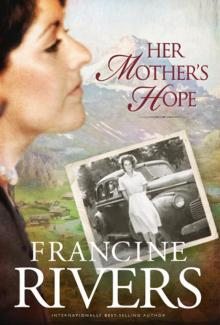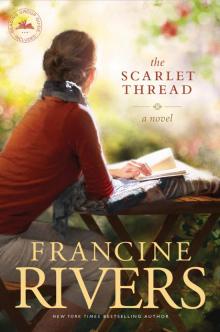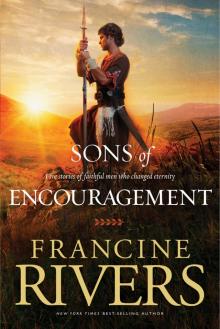- Home
- Francine Rivers
The Scarlet Thread Page 3
The Scarlet Thread Read online
Page 3
“It might help to take your mind off the matter for a few hours and then try to think about it later,” her mother said.
Heart aching, Sierra sat down on the sofa again. She looked at the open trunk and piles of boxes. “Why are you doing all this now, Mom?”
Something flickered in her mother’s eyes. “It’s a good winter activity, don’t you think?” She glanced around. “It’s such a mess. Your father and I meant to go through all this stuff years ago, but then . . .” She looked sad. “Time has a way of getting away from us.” She looked around the room at the odd assortment of treasures, some ratty and from long-forgotten sources. “I don’t want to leave all this chaos for you and Mike to have to figure out.”
She rose and walked around the attic, brushing her hand lightly over an old rocking chair, a bookshelf, a baby’s pram.
“I’m going to sort and put all of Mike’s and your things over there in the north corner. You two can decide what you want to keep and what you want to throw away. Special things from your father’s family and mine, I’ll repack. Most of your father’s papers from the business can be burned. There’s no point in keeping them. And Grandpa’s paintings . . . some of them are disintegrating.”
“Some of them are really bad,” Sierra said, grinning.
“That, too,” her mother agreed with a laugh. “It kept him occupied.” She stopped near the window, glancing out at the front lawn, her expression pensive. “There are a lot of family papers. I’ll have all winter to go through and organize them for you and Mike.” She glanced back at Sierra and smiled. “It’s a big job, but I think it’ll be fun and interesting.”
She came back and sat down on the old flowered sofa. “This trunk belonged to Mary Kathryn McMurray. She was one of your ancestors. She came across the plains in a wagon in 1847. I was just glancing through her journal when you came,” she said, taking up a leather-bound volume from the trunk and brushing her hand over it. “I hadn’t gotten very far. Apparently, this was an assignment book and then it became her diary.”
She set the volume between them on the couch. Sierra picked it up and opened it, reading the childish scrawl on the first page.
Mama says livin in the wildurnes aint no resun to bee ignurant. Her papa wuz a larnud man and wud not want fuls in his famlee.
“The trunk was part of Grandpa Clanton’s estate,” her mother said. “I haven’t gone through these things in years.” She lifted out a small carved wooden box. “Oh, I remember this,” she said, smiling. Inside was an embroidered silk handkerchief. She unfolded it carefully and showed Sierra the antique gold chain and amethyst cross.
“Oh, it’s beautiful,” Sierra said, taking it and admiring it.
“You may have it, if you’d like.”
“I’d love it,” Sierra said, opening the small clasp and putting it on.
Her mother took out an old tintype in an oval frame. The couple were dressed in wedding clothes, their expressions solemn rather than joyful. The groom was handsome in his dark suit and starched shirt, his dark hair brushed back cleanly from chiseled features and intense pale eyes. Blue, Sierra decided. They would have had to be blue to be so pale in the picture. The bride was very young and lovely. She was wearing a gorgeous white lace Victorian wedding dress. She sat while her husband stood, his hand firmly planted upon her shoulder.
Sierra took out another box. Inside, wrapped in tissue paper, was a small woven Indian basket with designs. Around the top edge were quail plumes and beads. “I think this is a gift basket, Mom. It’s worth a lot of money. They have them in the Indian Museum at Sutter’s Fort.”
“Is there anything inside the box to tell about it?”
Sierra removed everything and shook her head. “Nothing.”
“Look at this old Bible,” her mother said, distracted. As she opened it, a section slipped free and fell onto the floor. Her mother picked it up and placed it on the sofa beside her.
Sierra picked up the paper yellowed with age and read the pretty script.
Dearest Mary Kathryn,
I hope you have changed your mind about God. He loves you very much and He is watching over you. I do not know what hardships and losses you will face on the way to Oregon or what will happen once you reach the end of the trail. What I do know is God will never leave you nor forsake you.
You have my love and are in my morning and evening prayers. The ladies from the quilting club send their love as well, as do Betsy and Clovis. May the Lord bless your new home.
Aunt Martha
Sierra’s mother thumbed through the black, cracked leather Bible and then picked up the portion that had fallen. “Look at how worn the pages are.” She smiled. “Mary Kathryn favored the Gospels.” She took the note from Sierra and read it. Folding it, she tucked it in the loosened pages and set the Bible carefully beside Mary Kathryn McMurray’s journal.
Sierra took out a decaying flowered hatbox. She found a note on top saying simply, in beautiful black calligraphy, “Save for Joshua McMurray.” The box was full of animals, carved of wood, each wrapped carefully in a scrap of flowered calico or checked gingham. She unwrapped a fierce-looking wolf, a majestic buffalo, a coiled rattlesnake, a prairie dog standing on its hind legs, a comical jackrabbit, a beautiful antelope, two mountain goats locked together in fierce battle, and a grizzly bear standing upright, ready to attack.
At the bottom of the trunk was a large package wrapped in butcher paper and tied with string.
“I don’t remember this,” her mother said and slipped the string off so she could remove the wrapping. “Oh,” she said in wonder and excitement. “I think it’s a crazy quilt.” She unfolded it enough so that Sierra could take one end of it and then stood, spreading the folds to reveal the full pattern.
It wasn’t a crazy quilt, but a picture quilt with squares made of hundreds of different scraps of cloth, each with a different scene, each framed with an edging of brown, and all stitched together with vibrant scarlet thread. Each picture block was surrounded by a different stitch: blanket, crosses, herringbone, doves, fern, olive branches, feather, open cretan, fly, zigzag chain, wheatear and sheaf filling stitches, Portuguese border, and star eyelets.
“It’s beautiful,” Sierra said, wishing she could have it.
“If I’d known it was here, I would have had it cleaned and hung on the living room wall years ago,” her mother said.
Sierra looked at the squares one by one. Along the top row was a homestead with a man, a woman, and three children. Two boys and a girl stood in the open space between the cabin and barn. The second square was bright with consuming flames. The third showed a baby in a manger, a young girl watching over him while darkness surrounded them both.
The telephone rang downstairs. A second later, the portable phone rang from nearby. Sierra’s mother handed her the other end of the quilt and went to pick up the phone from the top of a box and answer it.
“Yes, she’s here, Alex.”
Sierra’s heart lurched. Hands trembling again, she folded the quilt while listening to her mother’s side of the conversation.
“Yes, she told me. Yes, but that’s to be expected, Alex.” Her mother’s tone held no condemnation or disappointment. She was silent for a long moment, listening again. “I know that, Alex,” she said very gently, her voice husky with emotion, “and I’ve always been thankful. You don’t have to explain.” Another silence. “So soon,” her mother said, resigned. “How are your parents taking it? Oh. Well, I imagine it’s going to be a shock to them as well.” She smiled faintly. “Of course, Alex. You know I will. Let me know after you’ve spoken to them, and I’ll call.”
Marianna cupped her hand over the receiver. “Alex wants to talk to you.”
Sierra wanted to say she didn’t want to talk to him but knew that would put her mother between them. She laid the folded quilt back over the trunk and crossed the attic to take the phone from her mother’s hand.
“I’ll make us some coffee,” her mother said with a gent
le smile.
Sierra watched her go down the stairs, knowing her mother was allowing her privacy to speak with Alex. She felt a tangle of emotions, from relief to despair. Her mother hadn’t said one word to discourage Alex from his decision. Why not?
“Yes?” she said into the receiver, her voice coming out thin and choked. She wanted to scream at him and could barely draw breath past the pain in her chest. Her throat was tight and dry.
“I was worried about you.”
“Were you?” Why should he worry about her just because he was ripping her life apart? Resentment filled her and hot tears welled again in her eyes.
“You’re not saying much.”
“What do you want me to say? That I’m happy?”
He sighed. “I suppose that would be expecting too much, especially considering this is the biggest opportunity of my career.”
She heard the tinge of disappointment and anger in his voice. What right had he to be angry with her after making a life-changing decision without so much as hinting it to her?
“I’m sure the children will be thrilled to hear they’re being uprooted and torn away from their friends and family.”
“We’re their family.”
“What about Mom? What about your parents?”
“We’re not moving to New York, Sierra.”
“I guess you’re saving that for next year’s big surprise.”
Silence followed. Her heart picked up speed; she could feel his growing anger.
Stop this now, an inner voice cautioned her. Stop before you go too far. . . .
She wasn’t interested in stopping. “You might have hinted what was going on, Alex,” she said, clutching the phone.
“I’ve done more than hint. I told you about this company weeks ago. I’ve been telling you for the last four years what I want to do. The problem is you don’t listen.”
“I listen.”
“And never hear.”
“I do too hear!”
“Then hear this. You’ve had it your way for ten years. Maybe, just for a change, you could cut me a little slack.”
Click.
“Alex?” Dead silence filled her ear. Sierra blinked, shocked. She stared at the phone in her hand as though it had turned to a venomous snake. Alex had never hung up on her before.
More distressed than when she had arrived, Sierra went downstairs. The tantalizing aroma of freshly ground caramel au lait decaf filled the kitchen. Her favorite. So, too, were the Toll House cookies her mother had put on a dessert plate in the sunny alcove overlooking the back garden. Clearly Mom wanted to cheer her up. Fat chance.
She plunked the phone down on the pretty flower-embroidered cloth covering the small table and sank down onto the chair. “He hung up on me.” Her mother poured coffee for her. “He’s never hung up on me before,” Sierra continued, her voice breaking as she looked up at her mother. He’d made a decision he knew would tear her life to pieces, and then he hung up on her? “He said I don’t listen.”
Her mother set the carafe on a sunflower trivet and took the seat facing her. “Sometimes we only hear what we want to hear.” She picked up her coffee cup and sipped, distracted.
“You look tired, Mom.”
“I didn’t sleep very well last night. I kept thinking about your father.” Her mouth curved faintly, her expression softening. “Sometimes I imagine him sitting in his chair watching the news on television. The house creaks and I awaken, thinking he’s coming along to bed.” She smiled sadly and looked down into her coffee as she set the cup back in its porcelain saucer. “I miss him.”
“I miss him, too.” He might have been able to talk Alex out of going to Los Angeles.
Her mother lifted her head and looked across at her with gentle humor. “Your father wasn’t an easy man either, Sierra, but he was worth it.”
“If Alex insists, I’ll go, but I don’t have to smile and pretend to be happy about it.”
“Maybe not, but it’d be better if you came to terms with his decision. Resentment and anger eat away at love as quickly as rust is corroding that metal lawn chair out there in the backyard. One of life’s great tragedies is watching a relationship unravel over something that could’ve been resolved in one intelligent, adult conversation.”
Her mother’s words hurt. “One conversation isn’t going to change Alex’s mind.”
“Then it depends on what you really want.”
Sierra raised tear-soaked eyes to her mother’s clear hazel ones. “What do you mean?”
Marianna reached out and took her daughter’s hand. “It’s simple, Sierra. Do you want your own way, or do you want Alex?”
Chapter 2
Sierra left her mother in time to drive to Windsor and pick up the children from school. They slammed into the car and immediately began vying for her undivided attention. She was often amused by their antics. Today their youthful exuberance and competitiveness irritated. As she drove along Brooks Road toward the foothills, she heard only bits and pieces of their day, distracted by her own turbulent thoughts. She longed for a quiet place to lick her wounds.
Her heart began beating a battle rhythm when she saw Alex’s Honda in the driveway. He never came home before five thirty.
“Daddy’s home!” Carolyn said, dashing out the car door toward the front steps, her backpack forgotten in the front seat.
Sierra pressed the garage door opener and watched the door lift slowly. She drove in, shifted into park, put on the brake, and turned off the engine—each movement carefully measured and controlled. “Take Carolyn’s things in, would you please, Clanton?”
“Let her come out and get ’em herself.”
“It wouldn’t hurt you to help—”
“I’m not her personal servant. Besides, she was just bragging about girls being better than boys. So let Little Miss Wonderful carry her own backpack!”
“Don’t argue with me. I’m not in the mood for it.”
Clanton grumbled, but one look at her face silenced further protests. Sierra gathered her own things and followed him into the kitchen. She could hear Carolyn chattering happily and Alex’s deep laugh. A sharp pang shot through her, though whether it was pain or anger, she couldn’t tell. Maybe both. How could he laugh at a time like this? Didn’t he care at all how she felt?
“Why are you home early, Dad?” Clanton’s excited voice carried easily, as did the thud of the two backpacks hitting the living room floor. Alex answered too quietly for her to hear what he was saying, and she clenched her teeth. As she opened a cabinet and took a can of coffee down from the shelf, she listened to the quiet murmur of voices, subdued now. Was he telling the children he had decided to uproot them and take them away from friends and family? How were they taking it? She knew she should be there, helping them understand . . . but how could she do that when she didn’t understand herself? Her hand trembled as she measured grounds.
Her throat closed tightly when she heard Alex enter the kitchen. She didn’t look at him. She couldn’t and still maintain any semblance of control. She poured water into the coffeemaker and then turned her attention to the package of chicken she had left to thaw on the counter.
“I’m sorry I hung up on you.” His deep voice was low and quiet.
Her eyes burned. She removed the plastic wrap from the chicken and turned on the water. “Did you tell them?”
“Yes.”
She took a thigh from the open package and began washing it meticulously. “And?”
“Carolyn’s going down to Karen’s house. Clanton’s riding his bike over to David’s.”
“I never let them go anywhere until they finish their homework.”
“Well, I think this is a day for exceptions to the rule, don’t you?” He sounded so in control. It grated on her nerves. “I told them to be home by five.” He leaned against the doorframe and crossed his arms. “I thought it might be a good idea to have them both out of the house while we talk things over.”
“Talk?” she s
aid stiffly. “It’s a little late, isn’t it? I was under the impression you’d already decided everything.”
“Fine,” he said tightly. “We’ll do this your way. We won’t talk.”
Glancing back, she saw him go back into the family room. Her heart pounded heavily, her stomach tightened. It was the second time today he had flung an unfair accusation at her! She pitched the last piece of rinsed chicken onto the cutting board, washed her hands with soap, and slapped off the tap. Snatching the towel from the oven door handle, she dried her hands quickly, then flung the towel in the direction of the counter before following him, trembling with anger.
“My way,” she said. “You’re the one who called and said we’re moving. ‘Oh, and by the way, Sierra, a Realtor’s coming by tonight to list your home!’”
“Our home,” he corrected, his dark eyes narrowing.
“That’s what I thought until you dropped your bomb!”
“I made a judgment call.”
“You just got a promotion and a raise. When most people are shaking in their boots about the possibility of being laid off, you have job security, pension, health coverage. We have a nice home. The children are happy—”
“Most people never get an opportunity like this, Sierra.”
“An opportunity for what? To work for a new company that may go broke in a year?”
“I don’t think that’s likely.”
“But you don’t know for sure.”
“No, I don’t know for sure,” he said, angry now. “I haven’t got a crystal ball. But I have a strong feeling about where they’re going, and I want to go along for the ride.”
“A feeling? And you talk about me basing everything on emotions.”
“This is different,” he said through his teeth.
“What’s different about it? You’ve worked so hard for security—”
“Security isn’t everything.”
She closed her ears to his remark. “And now you’re throwing everything away on a whim.”
“I’m not throwing anything away! You still don’t get it, do you? Everything I’ve done up to now has been to prepare myself for an opportunity like this. I’m not going to spend the rest of my life building someone else’s ideas. I have my own!”

 An Echo in the Darkness
An Echo in the Darkness A Lineage of Grace
A Lineage of Grace The Prince: Jonathan
The Prince: Jonathan Bridge to Haven
Bridge to Haven The Priest: Aaron
The Priest: Aaron Her Mother's Hope
Her Mother's Hope Redeeming Love
Redeeming Love The Scarlet Thread
The Scarlet Thread The Masterpiece
The Masterpiece The Last Sin Eater
The Last Sin Eater The Prophet: Amos
The Prophet: Amos As Sure as the Dawn
As Sure as the Dawn Her Daughter's Dream
Her Daughter's Dream A Voice in the Wind
A Voice in the Wind The Warrior: Caleb
The Warrior: Caleb The Scribe: Silas
The Scribe: Silas And the Shofar Blew
And the Shofar Blew The Atonement Child
The Atonement Child Unshaken_Ruth
Unshaken_Ruth Unspoken_Bathsheba
Unspoken_Bathsheba The Scribe
The Scribe Sons of Encouragement
Sons of Encouragement The Shoe Box
The Shoe Box Sycamore Hill
Sycamore Hill Unafraid_Mary
Unafraid_Mary Marta's Legacy Collection
Marta's Legacy Collection